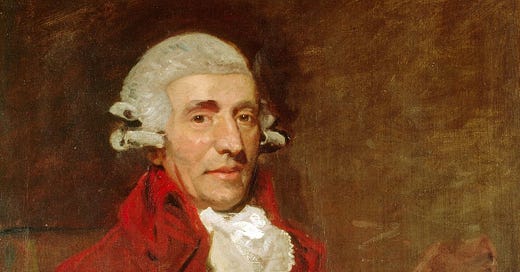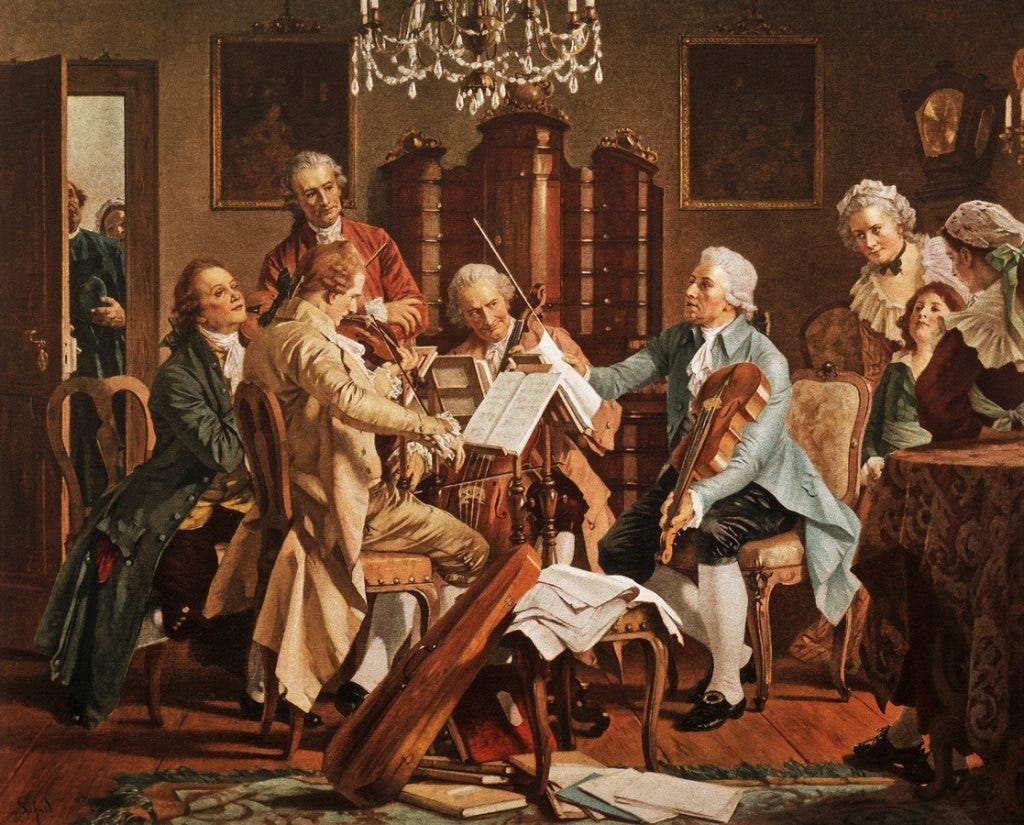This is the first installment in my series, “Great people saying great things about Mozart.” (See my prelude.)
Not everything great composers have said is worth taking at face value. But when patterns emerge, it’s worth paying attention. It would be bizarre for many great minds to be completely wrong about the same thing. Not impossible, but unlikely. Likewise, aesthetic testimony is not always reliable. Indeed, much of it is probably not worth much. Experience art for yourself, don’t just trust the experts! But under the right circumstances, we learn something from aesthetic testimony. And I think that nearly two centuries’ worth of great minds saying great things about Mozart tells us something about Mozart.
Let’s start with some high praise from the friend and mentor, Joseph Haydn (‘Papa Haydn’), one of his contemporaries that Mozart respected as a peer. Admiration was mutual.
Mozart dedicated his six famous string quartets, later called ‘Haydn Quartets’, to Haydn. On September 1, 1785, Mozart, then 29 years old, wrote to Haydn, then 53 years old:
To my dear friend Haydn.
A father who had decided to send his sons out into the great world thought it his duty to entrust them to the protection and guidance of a man who was very celebrated at the time, and who happened moreover to be his best friend. In the same way I send my six sons to you ... Please, then, receive them kindly and be to them a father, guide, and friend! ... I entreat you, however, to be indulgent to those faults which may have escaped a father's partial eye, and in spite of them, to continue your generous friendship towards one who so highly appreciates it
After discovering the quartets, Haydn wrote to Mozart’s father, Leopold:
Before God and as an honest man I tell you that your son is the greatest composer known to me either in person or by name; he has taste, and, furthermore, the most profound knowledge of composition.
Haydn was an underrated great in his own right, father of the symphony, father of the string quartet, and driving force in the development of the sonata form, the backbone of classical music from the mid-18th century to the early 20th century. In a letter to a friend in 1787, Haydn wrote:
If I could only impress on the soul of every friend of music, and on high personages in particular, how inimitable are Mozart’s works, how profound, how musically intelligent, how extraordinarily sensitive! (for this is how I understand them, how I feel them) — why then the nations would vie with each other to possess such a jewel within their frontiers… but should reward him, too: for without this, the history of great geniuses is sad indeed, and gives but little encouragement to posterity to further exertions… It enrages me to think that this incomparable Mozart is not yet engaged in some imperial or royal court! Forgive me if I lose my head. But I love this man so dearly.
Haydn last saw Mozart one year before his death, leaving Vienna for London in December 1790. According to one retelling of their parting day,
Mozart said to Haydn, at a happy meal with Salomon, “You will not bear it very long and will probably soon come back again, because you are no longer young.” “But I am still vigorous and in good health,” answered Haydn. He was at that time almost 59, and didn't find it necessary to hide his age. But for Mozart's early death on 5 December 1791, he would have taken Haydn's place in Salomon's concerts in 1794.
Haydn heard of Mozart’s death at age 35 while still in London. He wrote to their mutual friend Michael Puchberg,
I was for some time quite beside myself over his death. I cannot believe that Providence should so quickly have called an irreplaceable man into the next world.
After his death, Haydn also appears to have said,
Posterity will not see such a talent again in 100 years!
and
Mozart was a truly great musician. Friends often flatter me that I have some genius. But he stood far above me.1
Haydn appears to have repeatedly told others he considered Mozart his superior. Maybe you disagree with Haydn’s own judgment, and that’s fine. But it would be odd to affirm Haydn’s greatness without giving at least some weight to his testimony. And if Haydn thought Mozart was great, and you think Haydn is great, then you should probably give Mozart a fair hearing.
Next time, a big jumble of remarkable quotes.
For references, see the Wikipedia entry, “Haydn and Mozart” and H. C. Robbins Landon, Haydn: Chronicle and Works. Haydn in England, 1791-1795 (London: Thames and Hudson, 1976). For more context and a more careful examination of the mythologizing of Haydn and Mozart’s relationship, see Simon P. Keefe, Haydn and Mozart in the Long Nineteenth Century: Parallel and Intersecting Patterns of Reception (Cambridge University Press, 2023), which I’ve only briefly looked at. For an authoritative biography of Mozart, I recommend Jan Swafford’s wonderful Mozart: The Reign of Love (HarperCollins, 2020).






